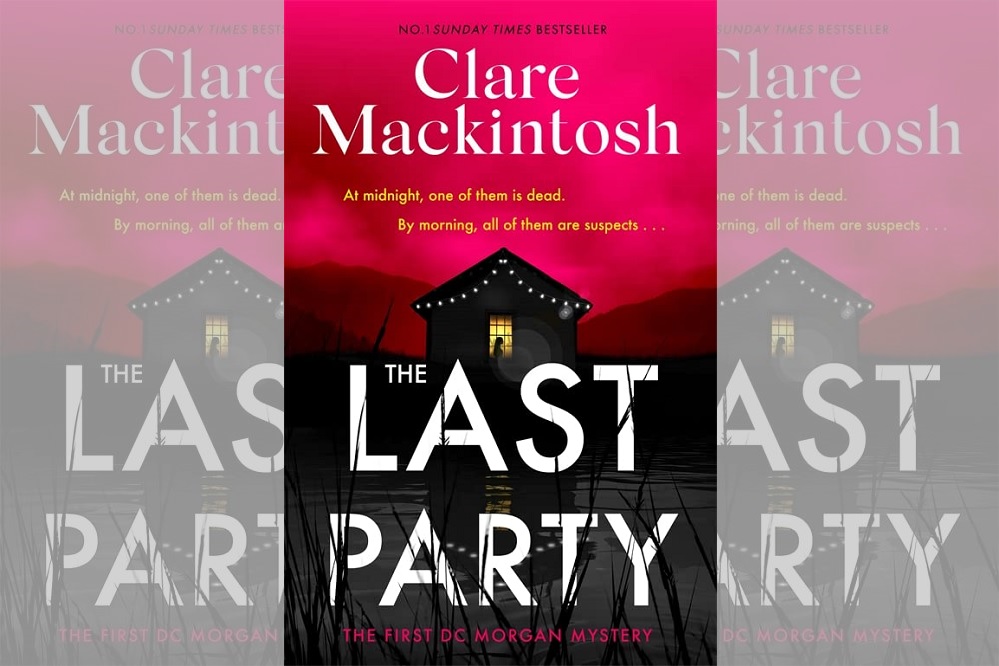Review: The Last Party by Clare Mackintosh

Myfanwy Alexander
I open the well-designed cover of best-seller Clare Mackintosh’s latest murder mystery with a certain trepidation.
It was neither the genre which sparked my concern, as I love a ‘whodunnit’ nor the author, as I have read and enjoyed several of Mackintosh’s previous novels.
What worried me was that, having moved to Bala some years ago, Mackintosh had naturally decided to set her latest book in rural North Wales and my experience of books set in an area I know and love has generally been less than positive.
The rugged landscape lends itself to dark tales, on TV as well as in books and we are now well accustomed to being portrayed as gibbering psychopaths for whom plaster on the walls is an unimagined luxury, a benighted people so devoid of entertainment that watching blueish flies feast on bodily fluids on the walls of long-abandoned garages is our idea of a big night out.
And yes, I am aware I may seem thin-skinned, but one does rather tire of one’s community being portrayed as inbred monsters: last time I looked, most of my neighbours have the usual number of fingers and the newly-coiffed Young Farmers’ Tug of War Team do not conceal extra eyes beneath their ill-advised mullets.
When I learnt that Mackintosh, herself a former police officer, was planning a series of novels featuring a North Wales detective, DC Ffion Morgan, I also bristled, as rural police forces are often portrayed as incompetent, unsophisticated oiks, relying on their slick urban colleagues to solve anything more complex than a lost raffle ticket.
This tendency for outsiders to solve all our problems because, let’s face it, we leave far too many fingerprints because of all our extra fingers, is compounded by the border, which is often seen as a Contour of Competence, with dazzlingly clever English detectives contrasted with the blunderings of the scarcely human Welsh plods.
A few real pippins
It is greatly to Mackintosh’s credit that she has avoided all of these tired tropes. The Last Party is set in a luxury lakeside development which itself forms part of a wider community, Cwm Coed, which is depicted with verve and affection.
The fictional lake, which clearly recollects Llyn Tegid, though set on the border, is the glistening heart of the book and the reader is able to discern much about the characters from the part the lake plays in their lives.
Opening with a New Year’s Day swim, the action takes place around the slightly archly named Llyn Drych, which does indeed reflect the community and its individuals.
Mackintosh deftly exploits the contract between the wealthy residents of The Shore, the luxury holiday complex, and the Cwm Coed locals but, though the negative aspects of tourism are discussed, the tone is neither naive nor didactic.
As a former police officer, one might expect Mackintosh have mastered procedural matters but she wears her expertise lightly.
Though she gives the reader every confidence that she is fully aware of the difference between, say a SIO and Sia, who sang ‘Chandelier,’ it is clear that what really sparks Mackintosh’s interest is the interplay between characters, and she gives her readers a few real pippins to enjoy in The Last Party.
For those sensitive souls seeking nuanced exploration of the minute details of the human soul, I recommend going back to George Eliot or EM Forster but this is not why I read a detective story.
A thoroughgoing villain
What I am looking for is an engaging protagonist and DC Ffion Morgan is a great example of the type.
Her Cheshire colleague I am afraid only really registered as eye candy with me, though he does have a well-worked out back story.
Next on my whodunnit list is a thoroughgoing villain: I found myself hissing as if at a pantomime as I turned the pages of The Last Party.
Whether by accident or design, the residents of The Shore are enjoyable grotesques whereas the Cwm Coed residents have more depth, perhaps because we will see them again in future DC Ffion Morgan stories.
My trepidations proved groundless: in The Last Party, Mackintosh has made a very decent stab at a portrait of a North Walian community.
And, as I need to remind myself, her aim was not to provide a nuanced sociological analysis of life in contemporary rural Wales but to write a damn good yarn which will appeal to all lovers of a mystery story.
That she has accomplished this without affronting my almost pathological sensitivity is quite a feat; as I don’t need both hands to clutch, horrified at my pearls, but am able to reach out for the next DC Ffion Morgan mystery, and I can’t wait.
The Last Party by Clare Mackintosh is published by Sphere and is available here and from all good bookshops.
Support our Nation today
For the price of a cup of coffee a month you can help us create an independent, not-for-profit, national news service for the people of Wales, by the people of Wales.





